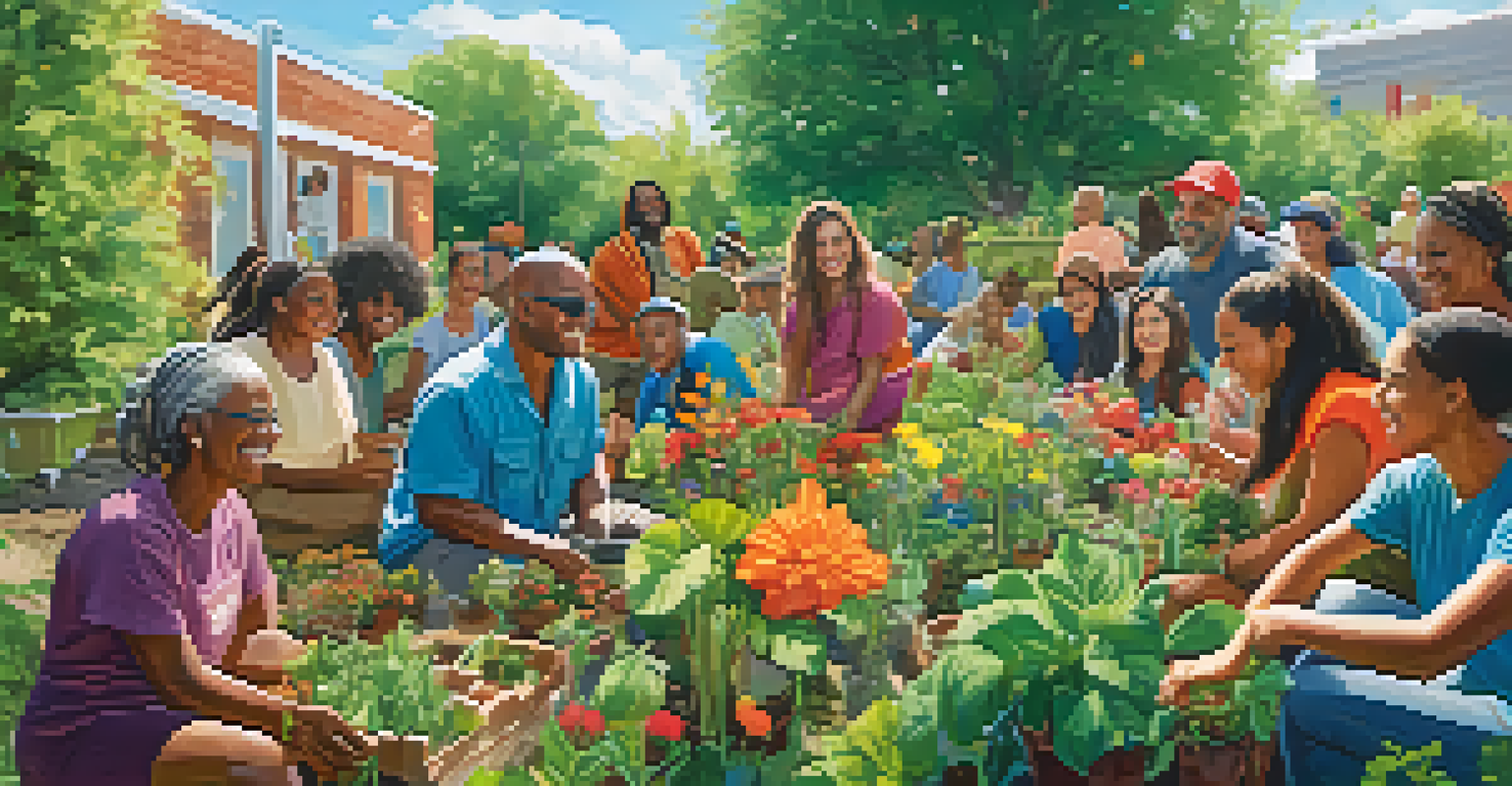Sustainability and Spirituality: Living in Harmony with Nature

Understanding Sustainability and Spirituality
Sustainability involves meeting our present needs without compromising future generations' ability to meet theirs. It's about more than just recycling or reducing waste; it's a holistic approach to living that respects the planet. Meanwhile, spirituality encompasses the beliefs and practices that connect us to something greater than ourselves, often invoking a sense of belonging to the universe.
We do not inherit the earth from our ancestors; we borrow it from our children.
When we weave sustainability into our spiritual practices, we begin to see nature not just as a resource but as a sacred partner in our journey. This connection fosters a deep respect for the environment, encouraging us to make mindful choices that benefit both ourselves and the planet. By understanding these concepts together, we can start to cultivate a lifestyle that honors both our spiritual and ecological responsibilities.
Examples of this harmony can be found in various cultures that integrate their spiritual beliefs with environmental stewardship. From indigenous practices that honor the Earth to modern movements advocating for eco-friendly living, the message is clear: when we nurture our spirituality, we also nurture our planet. This interconnectedness can inspire profound changes in how we interact with the world around us.
The Role of Mindfulness in Sustainable Living
Mindfulness is the practice of being fully present and aware of our thoughts, feelings, and surroundings. When we apply mindfulness to our daily lives, we become more attuned to the impact of our choices on the environment. This heightened awareness allows us to make decisions that align with both our spiritual values and sustainable practices.

For instance, taking a moment to reflect before purchasing a product can lead to more conscious consumerism. We might ask ourselves questions like, 'Where does this come from?' or 'What will happen to it after I’m done using it?' Such reflections can steer us towards more sustainable options, like buying locally or choosing products with minimal packaging.
Community Strengthens Eco-Spirituality
Building a community around shared sustainability and spirituality values amplifies efforts and inspires collective action for the planet.
Moreover, mindfulness practices, such as meditation or nature walks, can deepen our connection to the natural world. By slowing down and appreciating the beauty around us, we cultivate gratitude and respect for the Earth. This not only enhances our spiritual well-being but also motivates us to protect the environment we cherish.
Nature as a Source of Spiritual Inspiration
Many spiritual traditions view nature as a powerful source of inspiration and guidance. The beauty of a sunrise, the tranquility of a forest, or the rhythm of ocean waves can evoke a sense of awe and reverence. These experiences often remind us of our place within the larger tapestry of life, fostering a sense of connection to the Earth.
Look deep into nature, and then you will understand everything better.
Engaging with nature can also provide clarity and insight, helping us navigate life's challenges. For example, spending time outdoors can lead to moments of reflection, where we might find answers to questions that weigh on our minds. This natural setting can serve as a sanctuary, allowing us to reconnect with ourselves and our values.
Incorporating nature into our spiritual practices can take many forms, from outdoor meditations to nature-inspired rituals. By honoring the Earth in our spiritual lives, we reinforce our commitment to sustainability. This symbiotic relationship encourages us to protect the very environment that nurtures our souls.
The Impact of Community on Sustainable Spirituality
Building a community around shared values of sustainability and spirituality can amplify our efforts. When like-minded individuals come together, they can support each other in their journeys towards a more harmonious lifestyle. This sense of belonging fosters accountability and inspiration, encouraging members to take meaningful actions for both themselves and the planet.
Community initiatives, such as local clean-ups, community gardens, or spiritual retreats focused on nature, can be powerful ways to unite and create positive change. These collaborative efforts not only strengthen bonds but also highlight the importance of collective action in addressing environmental challenges. Together, we can amplify our impact and foster a culture of sustainability.
Sustainability Meets Spirituality
Integrating sustainability into spiritual practices fosters a deeper respect for the environment and encourages mindful living.
Participating in community events can also deepen our spiritual connections, as we share experiences and learn from one another. This shared journey can lead to a more profound understanding of how our spirituality and sustainability intersect. Ultimately, these connections remind us that we are all part of a larger community, both human and ecological.
Practicing Gratitude for Nature's Gifts
Gratitude is a powerful spiritual practice that can significantly enhance our relationship with nature. By acknowledging and appreciating the resources that the Earth provides, we cultivate a deeper respect for our environment. This practice encourages us to reflect on how our actions impact the world and inspires us to live more sustainably.
For instance, keeping a gratitude journal where we note down the beauty we observe in nature can shift our mindset. When we focus on what we appreciate about the Earth—be it a blooming flower or a clear blue sky—we begin to see the importance of protecting these precious gifts. This shift in perspective can motivate us to make more environmentally friendly choices.
Additionally, expressing gratitude can lead to a sense of fulfillment that reinforces our commitment to sustainability. When we recognize the interconnectedness of life, we become more aware of our role in preserving the planet for future generations. This profound appreciation can transform our daily habits, leading to a lifestyle that honors both our spiritual and ecological responsibilities.
Eco-Spiritual Practices to Embrace
Eco-spirituality combines ecological awareness with spiritual practices, offering a variety of ways to connect with nature. Some people find solace in outdoor meditations, where they can soak in the sounds and sights of their surroundings while reflecting on their connection to the Earth. Others might engage in rituals that honor the changing seasons, celebrating the cycles of nature.
Gardening can also be a powerful eco-spiritual practice, allowing us to nurture life and witness the beauty of growth firsthand. As we cultivate plants, we learn patience, responsibility, and the importance of caring for our environment. This hands-on approach fosters a deeper appreciation for the Earth and its resources.
Mindfulness Enhances Eco Choices
Practicing mindfulness helps individuals make conscious decisions that align with their spiritual values and promote sustainability.
Moreover, participating in local conservation efforts or wildlife volunteering can provide a tangible way to express our eco-spiritual beliefs. By actively contributing to the health of our environment, we embody our spiritual values in action. These practices not only enhance our connection to nature but also create a positive impact on the world around us.
Living a Life of Balance and Harmony
Achieving a harmonious balance between sustainability and spirituality is an ongoing journey. It requires intention and a willingness to adapt our lifestyles in ways that reflect our values. By being mindful of our choices, we can create a life that honors both our spiritual beliefs and our responsibility to the planet.
This balance can manifest in various ways, such as choosing eco-friendly products, reducing waste, or supporting local businesses that prioritize sustainability. As we incorporate these actions into our daily lives, we reinforce the interconnectedness of our spiritual and ecological paths. Each small step contributes to a larger movement toward harmony.

Ultimately, living in alignment with our values allows us to experience a more fulfilling and purposeful life. By recognizing the beauty of nature and our role in its preservation, we cultivate a sense of peace and connection. This journey towards sustainability and spirituality not only benefits us but also honors the Earth and all its inhabitants.